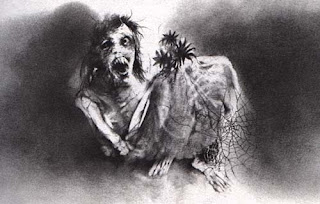Elegies, Earth-Walkers, and the Lord of the Rings
It is no secret that J. R. R. Tolkien was very much influenced by old Anglo Saxon literature. When contemplating the connections in between his work and Old English literature, I remembered learning about an elegy titled, "The Wanderer." In it a man, known as the "earth-walker," laments losing his lord, companions, and (how could you forget) his mead hall.
The sense of loss that pervades this poem is iconic of much archaic Anglo-Saxon literature. Here is the text in its original language. (Check out the use of thorn, I love that letter. Let's bring back þorn!) [Stop giggling that is NOT a "p."]
In the poem, the method of mourning the loss of what the "earth-walker" holds dear is done by the use of the word "where" and "what."
Here is an excerpt from the translation of "The Wanderer" by E. T. Donaldson:
So the Maker of mankind laid waste this dwelling-place until the old works of giants stood idle, devoid of the noise of the stronghold's keep-ers. Therefore the man wise in his heart considers carefully this wall-place and this dark life, remembers the multitude of deadly combats long ago, and speaks these words: 'Where has the horse gone? Where the young warrior? Where is the giver of treasure? What has become of the feasting seats? Where are the joys of the hall? Alas, the bright cup! Alas, the mailed warrior! Alas, the prince's glory! How that time has gone, vanished beneath the night's cover, just as if it never had been! The wall, the wondrous high, decorated with snake-likenesses, stands now over traces of the beloved company. The ash-spears' might has borne the earls away-- weapons greedy for slaughter, Fate the mighty; and storms beat on the stone walls, snow, the herald of winter, falling thick binds the earth when darkness comes and the night-shadow falls. . .
There is a scene in the film Lord of the Rings: The Two Towers where King Theoden is reflecting on the losses of his people and their impending doom before the Battle of Helm's Deep. I thought it was a great tribute to the spirit of the elegy in Anglo Saxon literature. Watch for yourself, and see if you can make the connections in between what the actor is saying in this scene and "The Wanderer."
What do you þink? And wouldn't you like to resurrect "þ"? :)
The sense of loss that pervades this poem is iconic of much archaic Anglo-Saxon literature. Here is the text in its original language. (Check out the use of thorn, I love that letter. Let's bring back þorn!) [Stop giggling that is NOT a "p."]
In the poem, the method of mourning the loss of what the "earth-walker" holds dear is done by the use of the word "where" and "what."
Here is an excerpt from the translation of "The Wanderer" by E. T. Donaldson:
So the Maker of mankind laid waste this dwelling-place until the old works of giants stood idle, devoid of the noise of the stronghold's keep-ers. Therefore the man wise in his heart considers carefully this wall-place and this dark life, remembers the multitude of deadly combats long ago, and speaks these words: 'Where has the horse gone? Where the young warrior? Where is the giver of treasure? What has become of the feasting seats? Where are the joys of the hall? Alas, the bright cup! Alas, the mailed warrior! Alas, the prince's glory! How that time has gone, vanished beneath the night's cover, just as if it never had been! The wall, the wondrous high, decorated with snake-likenesses, stands now over traces of the beloved company. The ash-spears' might has borne the earls away-- weapons greedy for slaughter, Fate the mighty; and storms beat on the stone walls, snow, the herald of winter, falling thick binds the earth when darkness comes and the night-shadow falls. . .
There is a scene in the film Lord of the Rings: The Two Towers where King Theoden is reflecting on the losses of his people and their impending doom before the Battle of Helm's Deep. I thought it was a great tribute to the spirit of the elegy in Anglo Saxon literature. Watch for yourself, and see if you can make the connections in between what the actor is saying in this scene and "The Wanderer."
 |
| Click to watch. |
What do you þink? And wouldn't you like to resurrect "þ"? :)


I haven't taken the time to dig back in to this bookshelf in a long while - writing such as this where it takes time for images to form, thoughts to pull together, impressions to arrive - read slow, slow... thanks for a great post! Bringing it out in a movie such as this gives a taste to others like myself who might not read the works it draws on. Interesting to think that for cultures long gone, this was their pop culture - the reflection of how they saw themselves - or wanted to see themselves - that was repeated, recorded and remembered. Great post.
ReplyDeleteNew follower. Love the site. I did enjoy Lord of the Rings immensely. Come visit me over at Livre De Amour-Books of Love Blog. Having a giveaway right now going on.
ReplyDeleteThanks for following! Will stop by. :)
ReplyDeleteGreat post. Back in 2004, I wrote my BA English dissertation on the influence of mythology and language in Tolkien. It's a fascinating subject!
ReplyDeleteOh wow! That dissertation sounds FASCINATING. I love stuff like this. Is it published? I'd be interested in reading it.
ReplyDelete